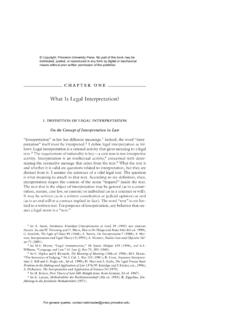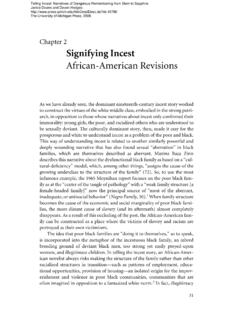Transcription of Accountability: the core concept and its subtypes - GOV.UK
1 Accountability: the core concept and its subtypes Staffan I. Lindberg Working Paper No. 1 Apr, 2009 Copyright: The author. Published on behalf of the Africa Power and Politics Programme (APPP) by the Overseas Development Institute, 111 Westminster Bridge Road, London SE1 7JD, UK ( ). The APPP Discussion Paper series is edited by Richard Crook, Professorial Fellow, Institute of Development Studies at the University of Sussex, Brighton BN1 9RE, UK The Africa Power and Politics Programme is a consortium research programme funded by the UK Department for International Development (DFID), with additional support from Irish Aid, for the benefit of developing countries.
2 The views expressed in this publication are those of the author and not necessarily those of DFID, Irish Aid or the Programme as a whole. Accountability: the core concept and its subtypes Staffan I. Lindberg Accountability is a central concept in comparative politics. Yet its growing popularity in a number of applied fields, including development policy, has resulted in a dilution of its content and introduced an undesirable semantic confusion. This paper argues that it may still be possible to recover from this state of affairs, by resisting conceptual stretching as recommended by Giovanni Sartori.
3 The paper contributes with a synthesized approach based on a widely recognized set of core features of accountability, and provides a typology of subtypes with examples. Implications for empirical research include the importance of distinguishing between accountability and responsiveness, and the difficulty of aggregating findings about different subtypes of accountability to construct general conclusions in causal form. 1 Making Sense of Accountability The concept of accountability has a long tradition in both political science and financial accounting.
4 In political science, John Locke s theory of the superiority of representational democracy built on the notion that accountability is only possible when the governed are separated from the governors (Locke, 1690/1980; cf. Grant and Keohane, 2005). It was also a major concern for the fathers of the American constitution, and few areas have been as fundamental to thinking about the political system in America as accountability ( Finer, 1941; Friedrich, 1940; Dubnick and Romzek, 1993). The central idea from that time is still with us: when decision-making power is transferred from a principal ( the citizens) to an agent ( government), there must be a mechanism in place for holding the agent to account for their decisions and if necessary for imposing sanctions, ultimately by removing the agent from power.
5 In accounting, the concept s long tradition is more limited in scope, referring to financial prudence and accounting in accordance with regulations and instructions ( Normanton, 1966; Barton, 2006), but the principle of delegating some authority, evaluating performance and imposing sanctions is essentially the same. In the last 10 to 15 years, however, the concept of accountability has become fashionable not just in expanding circles of political scientists and economists but among the broader community of scholars and practitioners concerned with such diverse areas as administration, development, business ethics, governance, international organizations, policy networks, democratization, civil society, and welfare state reform.
6 To illustrate this growth with an example from just one sub-field: when Schmitter and Karl (1991) contended that accountability was the central key to most definitions of democracy, their claim was met with overwhelming indifference and occasional expressions of hostility (cf. Schmitter, 2004). A decade and a half later, a quick search with any of the academic search engines using accountability in combination with democracy or democratization generates literally hundreds of results. Expanding the search to cover related fields in the social sciences, one is confronted with a dizzying number of entries, illustrating the magnitude of the explosion of articles on accountability in its various forms.
7 Assistant Professor, University of Florida Predictably, this proliferation has resulted in a myriad of meanings and dimensions associated with the concept of accountability . To make matters worse, the international donor community and their veritable crowds of consultants have picked up on this trend in their focus on good governance and added their (not always politically independent) peculiarities to the conceptual landscape. I write make matters worse because of the inherent dangers of a byzantine conceptual nightmare leading not only to stretching (Sartori, 1970, 1984, 1991) but to severe confusion about what the core meaning of accountability is, accentuated by donor-inspired reformulations divorced from sound research practices.
8 One may reply so what? since examples abound of essentially contested concepts (Gallie, 1958; Collier et al., 2006) which have produced both interesting and fruitful theoretical debates and spurred further empirical research. This paper is not an argument against such informed engagement in advancement of key concepts in the social sciences. Rather, it is an effort to escape the dangers of hi-jacking established concepts and endowing them with new meanings and dimensions which dilute their currency and create ambiguity, vagueness, and collective semantic confusion.
9 There is an important difference between a debate over the advantages and disadvantages of a few clearly delineated alternative definitions, and uncontrolled, myopic, and unrelated conceptual diversification. There are real dangers and costs to the conceptual confusion which can follow such developments. Indeed, if and when a concept takes on too many and at least partly contradictory meanings it loses its value as an analytical instrument. Studies using different notions of a concept such as accountability, and which arrive at different results, cannot be directly compared and therefore at best risk engaging in what can be likened to a dialogue of the deaf rather than constructive theoretical and conceptual advance.
10 At worst, results are transplaced from one meaning to the other resulting in false conclusions. Are we at that point with regard to accountability? Perhaps not, but the current state of affairs bears an uncanny resemblance to the situation regarding diminished subtypes in the study of democratization not long ago. For a while, scholars were constantly issuing new more or less helpful labels of democratically sub-optimal systems of rule. Collier and Levitsky (1995) reportedly stopped counting at 550 different democracy with adjectives when reviewing the literature in the We have not gotten that far yet in descriptive labels of accountability but after reviewing a substantial portion of the literature I have nevertheless counted well beyond 100 different subtypes and usages.
















